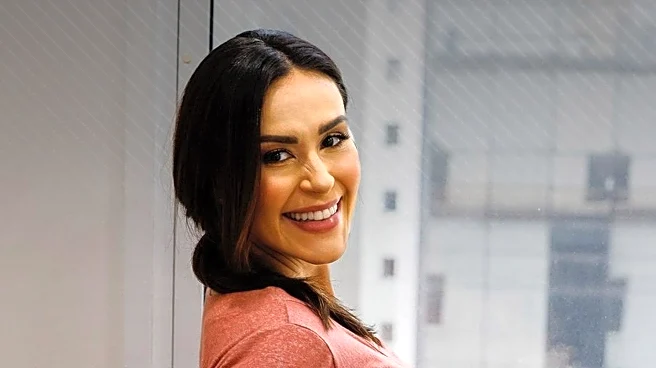What's Happening?
Elsie Hewitt, the girlfriend of comedian Pete Davidson, has shared her struggles with severe pregnancy pain. Hewitt, a model, disclosed on her Instagram Stories that she has been experiencing debilitating
pain since the beginning of her pregnancy. She attributes her discomfort to a combination of endometriosis and Hypermobile Ehlers-Danlos Syndrome, a connective tissue disorder that complicates pregnancy. Hewitt has tried various treatments, including physical therapy, acupuncture, and steroid shots, but has found little relief. Her condition has become so severe that she is unable to walk, and she describes her daily experience as one of constant suffering.
Why It's Important?
Hewitt's revelation highlights the challenges faced by individuals with complex medical conditions during pregnancy. Her experience underscores the need for greater awareness and support for women dealing with similar health issues. The combination of endometriosis and Ehlers-Danlos Syndrome can significantly impact quality of life and requires specialized medical attention. Hewitt's openness about her struggles may encourage others to seek help and advocate for better healthcare resources for pregnant women with chronic conditions.
What's Next?
As Hewitt continues to navigate her pregnancy, she may explore additional medical interventions or seek advice from specialists to manage her symptoms. Her public disclosure could prompt discussions among healthcare providers about improving treatment options for pregnant women with similar conditions. Additionally, Hewitt's story may inspire advocacy efforts aimed at increasing research funding for endometriosis and Ehlers-Danlos Syndrome, potentially leading to advancements in treatment and care.
Beyond the Headlines
Hewitt's experience raises ethical questions about the adequacy of healthcare support for pregnant women with chronic conditions. It also highlights the emotional and psychological toll of living with persistent pain, which can affect mental health and well-being. Her story may contribute to broader conversations about the importance of comprehensive prenatal care and the need for healthcare systems to address the unique challenges faced by women with complex medical histories.









